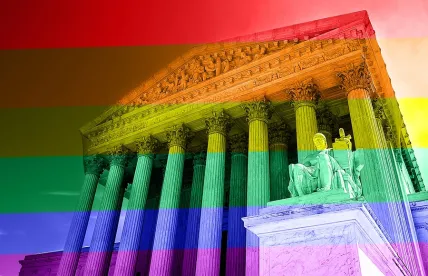Today, June 15, 2020, the Supreme Court of the United States issued a landmark decision in Bostock v. Clayton County, Georgia, holding that Title VII of the Civil Rights Act of 1964 (“Title VII”) protects lesbian, gay, bisexual, and transgender workers. The Court held that employers who discriminate against employees based on sexual orientation or gender identity unlawfully intend to rely on sex in their decision-making. Justice Gorsuch, along with Chief Justice Roberts and the four liberal justices of the Court, wrote, in deciding the question of whether an employer can fire an individual for being homosexual or transgender: “the answer is clear.” Specifically, “an employer who fires an individual for being homosexual or transgender fires that person for traits or actions it would not have questioned in members of a different sex. Sex plays a necessary and undisguisable role in the decision, exactly what Title VII forbids.” Ultimately, “an employer who fires an individual merely for being gay or transgender defies the law.”
Bostock v. Clayton County, Georgia consisted of three individual employment cases, all of which involved an employer terminating the employment of a long-time employee shortly after the employee revealed the he or she was homosexual or transgender. Gerald Bostock worked as a child welfare advocate for Clayton County, Georgia for over ten years and was fired shortly after participating in a gay recreational softball league. The reason given for his termination was an allegation of misspent funds and “conduct unbecoming of a county employee;” however, Bostock argued that was pretense and the real motivation for his termination was his sexual orientation. Both the District Court and the Eleventh Circuit held that Title VII did not include protection against discrimination towards sexual orientation.
In Altitude Express Inc. v. Zarda, Donald Zara worked as a skydiving instructor for Altitude Express in New York. Zarda worked for the company for several years and his employment was terminated shortly after mentioning to his employer that he was gay. While the District Court ruled in favor of the employer, the Second Circuit ruled that Title VII protects employees from discrimination based on sexual orientation.
Lastly, in R.G. & G.R. Harris Funeral Homes Inc. v. Equal Employment Opportunity Commission, Aimee Stephens, a funeral home employee in Garden City, Michigan, who originally presented herself as a male upon hiring, revealed to her employer during her sixth year of employment that she would be transitioning and working and living full-time as a woman. Shortly thereafter, she was dismissed from her job due to her transition. Initially, the District Court found for the funeral home on two bases: (1) Title VII did not protect transgender persons nor gender identity, and (2) the Religious Freedom Restoration Act permitted the funeral home to make employment decisions based on faith. The Sixth Circuit reversed this decision, ruling that Title VII's “discrimination by sex” does include transgender persons and also that the funeral home had failed to show how Title VII interfered with its owner’s religious expression.
Given the split among the circuit courts, the Supreme Court took up this trio of cases to render a clear determination as to whether sexual orientation and gender identity are protected categories under Title VII. This case of first impression signifies a key development in the interpretation and meaning of discrimination on the basis of “sex” under Title VII. The opinion resolved the issue of whether those who drafted Title VII could have intended protection of these classes, with Justice Gorsuch explaining: “Those who adopted the Civil Rights Act might not have anticipated their work would lead to this particular result. Likely, they weren’t thinking about many of the Act’s consequences that have become apparent over the years, including its prohibition against discrimination on the basis of motherhood or its ban on the sexual harassment of male employees. But the limits of the drafters’ imagination supply no reason to ignore the law’s demands. When the express terms of a statute give us one answer and extratextual considerations suggest another, it’s no contest. Only the written word is the law, and all persons are entitled to its benefit.”
Employers must ensure that their policies, including their equal employment opportunity, harassment, and discrimination policies, reflect this opinion and prohibit discrimination on the basis of sexual orientation and gender identity. In addition to these policy matters, employers should take actions to prevent discrimination on the basis of sexual orientation or gender identity and communicate the development in the law to employees and key decision makers in the company.
The full opinion can be found here.




 />i
/>i

